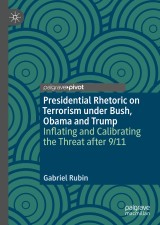Details

Presidential Rhetoric on Terrorism under Bush, Obama and Trump
Inflating and Calibrating the Threat after 9/11|
CHF 71.00 |
|
| Verlag: | Palgrave Pivot |
| Format: | |
| Veröffentl.: | 21.03.2020 |
| ISBN/EAN: | 9783030301675 |
| Sprache: | englisch |
Dieses eBook enthält ein Wasserzeichen.
Beschreibungen
<p></p><p></p><p>Through the analysis of eighteen years of presidential data, this book shows how Presidents Bush, Obama, and Trump have conducted and framed the war on terror since its inception in 2001. Examining all presidential speeches about terrorism from George W. Bush’s two terms as President, Barack Obama’s two terms as President, and Donald Trump’s first year as President, this book is the first to compare the three post-9/11 presidents in how they have dealt with the terror threat. <i>Presidential Rhetoric on Terrorism under Bush, Obama, and Trump </i>argues that when policies need to be “sold” to the public and Congress, presidents make their pertinent issues seem urgent through frequent speech-making and threat inflation. It further illustrates how after policies are sold, a new President’s reticence may signify quiet acceptance of the old regime’s approach. After examining the conduct of the war on terror to date, it concludes by posing policy suggestions for the future.</p><p></p><p></p>
1. Inflating the Terror Threat Since 2001.- 2. George W. Bush, Policy Selling and the Agenda-Setting After 9/11.- 3. Barack Obama: From an End to Terror to Drone Wars and ISIS.- 4. Donald Trump, Twitter, and Islamophobia: The End of Dignity in Presidential Rhetoric about Terrorism.- 5. How Can Presidents Properly Calibrate the Terror Threat?.
<p><b>Gabriel Rubin</b> is Associate Professor of Justice Studies at Montclair State University, USA. He received his Ph.D. in Political Science from the Massachusetts Institute of Technology, USA and is the author of <i>Freedom and Order: How Democratic Governments Restrict Civil Liberties after Terrorist Attacks—and Why Sometimes They Don’t</i> (2011).</p><p><br></p>
<div><p>Through the analysis of eighteen years of presidential data, this book shows how Presidents Bush, Obama, and Trump have conducted and framed the war on terror since its inception in 2001. Examining all presidential speeches about terrorism from George W. Bush’s two terms as President, Barack Obama’s two terms as President, and Donald Trump’s first year as President, this book is the first to compare the three post-9/11 presidents in how they have dealt with the terror threat. <i>Presidential Rhetoric on Terrorism under Bush, Obama, and Trump </i>argues that when policies need to be “sold” to the public and Congress, presidents make their pertinent issues seem urgent through frequent speech-making and threat inflation. It further illustrates how after policies are sold, a new President’s reticence may signify quiet acceptance of the old regime’s approach. After examining the conduct of the war on terror to date, it concludes by posing policy suggestions for the future.</p></div><div><p><b>Gabriel Rubin</b> is Associate Professor of Justice Studies at Montclair State University, USA. He received his Ph.D. in Political Science from the Massachusetts Institute of Technology, USA and is the author of <i>Freedom and Order: How Democratic Governments Restrict Civil Liberties after Terrorist Attacks—and Why Sometimes They Don’t</i> (2011).</p></div>
Provides a sweeping and comparative approach to how the war on terrorism has been conducted in America through the three Presidents who have held the position since 9/11 Offers the first data-driven look into how President’s since 9/11 have spoken about the terror threat Sheds new light on how policies are sold by Presidents and how public opinion is changed by speeches Debunks the myth that we live in a “post-9/11” world in terms of how terrorism is viewed by our leaders
“American public rhetoric changed after September 11, 2001. We spoke differently about our enemies and our struggle against terrorism. Rubin skillfully examines these changes and insightfully compares the discourse of our (so far) three post-9/11 presidents.”<p>—<b>David Zarefsky</b>, Professor Emeritus of Communication Studies, Northwestern University, USA</p>
<p>Rubin’s illuminating study of presidential terrorism rhetoric, rich in quantitative analysis, qualitative insights and compelling policy suggestions, is an outstanding contribution to terrorism studies that deserves to be widely read."</p>
<p>—<b>Jesse J. Norris</b>, Assistant Professor of Criminal Justice, State University of New York at Fredonia, USA. </p>
<p>Rubin’s illuminating study of presidential terrorism rhetoric, rich in quantitative analysis, qualitative insights and compelling policy suggestions, is an outstanding contribution to terrorism studies that deserves to be widely read."</p>
<p>—<b>Jesse J. Norris</b>, Assistant Professor of Criminal Justice, State University of New York at Fredonia, USA. </p>
Diese Produkte könnten Sie auch interessieren:

Herausforderungen und Chancen eines künstlerischen Wettbewerbs für ein Mahnmal in Gedenken an die Opfer des 19. Februar 2020 in Hanau

von: Katharina Meyer zu Eppendorf

CHF 30.00

Der erste arabisch-israelische Krieg und seine Folgen für die Palästinenser

von: Dean Sánchez Pedregoso

CHF 16.00














